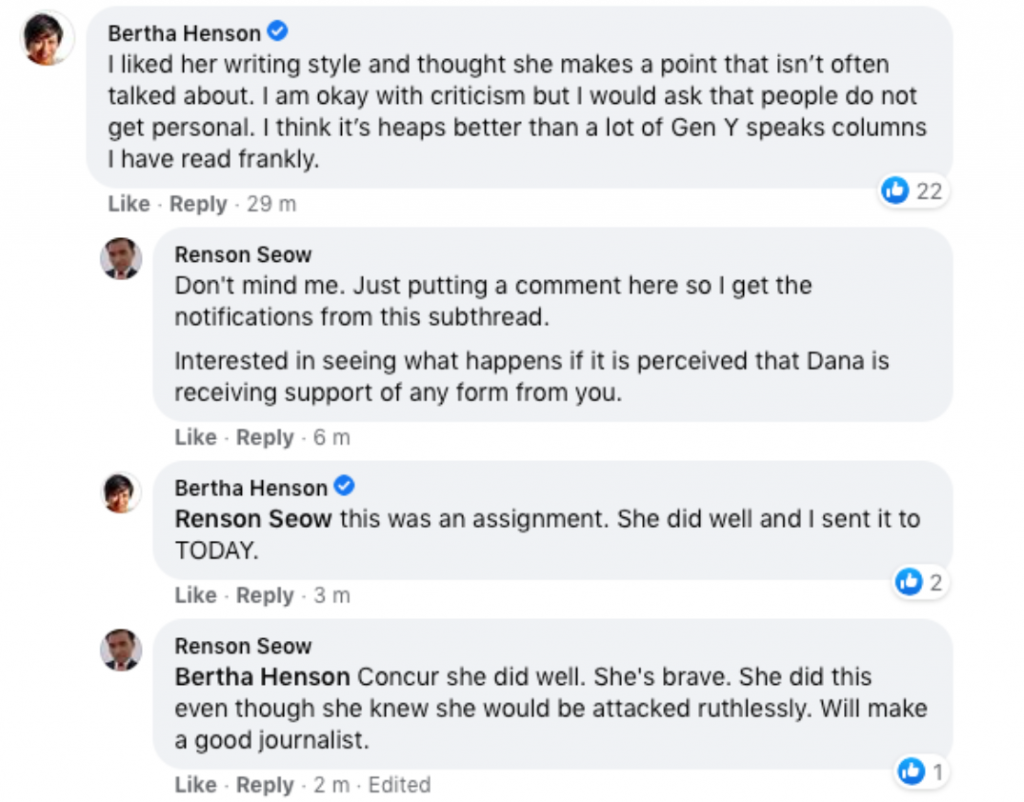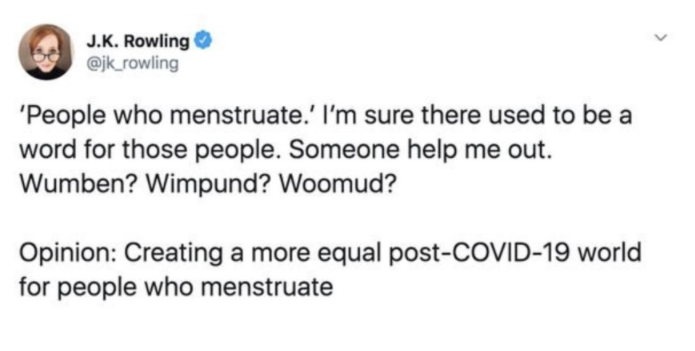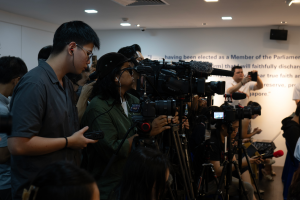On Sunday, a TODAY op-ed titled “This is why I don’t want to be woke. Don’t cancel me for it,” has been making the rounds on the internet, including on chat groups formed on Clubhouse.
The piece was authored by 24-year old NUS communications and new media student Dana Teoh as part of an assignment, and submitted to TODAY by her instructor Bertha Henson.

The response to the piece has been divided: some LGBTQ activists were furious, attributing the worst possible motives to the author, while others praised the student’s bravery for taking such an unpopular position on a sensitive issue.
At RICE, we support the right of anyone to publish their perspectives, even ones we don’t agree with.
As an editorial, however, there are glaring holes to the author’s argument that deserve to be addressed. To be clear: not all of this is the author’s fault, but the shared responsibility of the writer, the editor, and in Dana’s case, her journalism instructor who submitted the piece for publication, to work together to put out the strongest possible perspective.
To this end, RICE has conducted a peer review of the op-ed, using selected excerpts from the piece. You can read the full TODAY op-ed here.
The Author Pens A Clear Opening Thesis
Excerpt From the Original Article
“Being “hella woke” is foolish. Lower your pitchforks, and hear me out.
There are some aspects of the woke movement I genuinely applaud. For example, cancelling slurs like “slut”, “faggot”, and “tranny”.
Language shapes how we think, and consequently, how societies function.
In cancelling words and phrases that perpetuate negative stereotypes — women should not be sexually promiscuous, being gay or transgender is derogable — I believe we are making the world a better place.
What I cannot get on board with is the cancelling of people and organisations for believing or saying something that opposes the “woke stance”, whatever the issue.
The push for kinder and more inclusive norms should not entail condemning dissenters.”
RICE’s Commentary
I’ve got no problem with this introduction. The hook provocatively outlines the author’s perspective. She correctly identifies the power of language to shape social behaviours and norms, citing examples of words that perpetuate negative stereotypes.
Finally, her thesis rallying against cancel culture and for a kinder and more inclusive debate on sensitive topics is clear and concise. Personally, I agree with her opening position.
The J.K Rowling Example
Excerpt from the Original Article
I’ve included a screenshot of JK Rowling’s fall from grace in 2020:

Ah, she would rue the day she put this on Twitter.
The tweet exploded – it was quoted (retweeted with their own response, mostly negative) over 33,000 times and a whole bunch of news media outlets picked up the story, reporting it with woke undertones (read: “J.K. Rowling was so wrong for this”).
A year later, she still seems to be lying low — I haven’t seen her name in a while.
That is insane to me. Can we no longer have discussions? To what extent are we going to take this “cancelling” (extreme censorship)?
Perhaps Ms Rowling phrased her stance in a less-than-tactful manner. But she was trying to say something, wasn’t she?
She was trying to say that to her, in her personal opinion, trans women are distinct from cis women (cis is a term referring to a person who identifies with their birth gender).
RICE’s Commentary
This is an oversimplification of the J.K. Rowling cancel culture controversy. The author gives the impression that JK Rowling was cancelled based solely on the tweet screenshoted in the op-ed: a statement of fact that women do, in fact, menstruate.
This misses some important context surrounding the controversy. Before her 2020 tweet, Ms. Rowling has had a track record of showing support for multiple figures who were fired for their opinions that “men cannot change into women” and that ‘trans women can never be considered female’ .
More damagingly, Ms. Rowling has also put forward arguments linking her own experience of sexual assault with her concern over transgender access to women-only spaces.
To quote Ms. Rowling from her 3,600 word essay, she was worried that “the new trans activism” was eroding women and girls’ rights to single-sex spaces by “offering cover to predators,” effectively establishing a link between trans women and sexual predators.
This clearly perpetuates a negative stereotype of a minority group. Based on the author’s introduction, she should be against this.
The Author Puts Forward Her Personal Opinion
Excerpt from the Original Article
And at the risk of getting cancelled, I’m going to say there’s nothing wrong with that.
There’s nothing wrong with saying, believing, and perhaps even convincing some people that what she thinks is true. Everyone is entitled to the freedom of thought, if not of speech.
I myself am not particularly well-versed in trans issues, trans rights, and the trans experience overall. I’d say I’m pretty ignorant on the topic.
But as a young person who lives on the internet, I would never ever admit that I think being transgender is a little out there for me.
Being transgender is a concept that I (a straight, cis person) still grapple with — I do not fully comprehend the trans experience.
I still get weirded out by photos of post-op bodies, and still struggle with the argument that trans children should be given hormone blockers.
However, I would like to know what someone else — who may be very different from me — thinks about an issue as novel as trans rights and transphobia. Someone who’s trans, maybe.
RICE’s Commentary
The author has already established that there should be limits to freedom of speech, particularly in cases where language is used to perpetuate negative and harmful stereotypes. Linking trans women to sexual predators would probably qualify.
It’s perfectly fine for the author to admit her own ignorance on the subject of transgenderism, and I commend her for expressing a desire to learn more about it from a trans person. Although, as my Editor pointed out, her statement that she gets ‘weirded out’ by trans bodies could have been edited for tone without losing her original perspective.
The Piece Loses Momentum
Excerpt from the Original Article
But I can’t even admit that I’d like to know! Because now, even asking can be construed as disagreeing or being unsupportive of “the cause”, and thus, offensive.
And that sucks, because we are all still learning about this fairly new phenomenon (not being transgender, but living openly as a transgender individual).
In a room full of woke people, I would probably just sit quietly, smile, and nod if someone said: “Children should have access to puberty blockers, no questions asked!”
And that doesn’t help the trans community at all. All I’d be doing is pretending to understand and embrace all their choices, a facade erected to mask how ignorant and uncertain I actually am.
If I were allowed to speak freely without risking being crucified, I’d ask questions like: “There are people who de-transition (regret and reverse transitioning), if you halt puberty in children, could that be really bad for them? Because de-transitioning already sounds like a complex process.
“Add in the fact that they never developed fully — would it still be possible to help them de-transition? Also, how young is too young?”
Then we’d be able to have a real discussion, instead of just agreeing like sheep.
RICE Commentary
This is the point where the writer loses the plot; the author’s assertion that “I can’t even admit that I’d like to know!” is not supported by any examples or personal anecdotes.
It’s also highly doubtful that the average trans person would feel offended by someone who genuinely wants to learn more about their experiences — including asking the questions that the author proposed.
The paragraphs that follow are built upon this (very) shaky premise—that woke people will get offended if you ask questions. The author invokes a straw man of a fictional room filled with faceless woke people, who shame her into silence, or force her to express opinions that conform with the group identity.
None of this is backed by evidence or personal experience.
On the subject of hormone blockers, there is, in fact, plenty of nuance to the debate about whether children should have access to such treatments, none more so than within the trans community itself. After all, this impacts their own health.
But in the face of an imaginary room conjured up by the author, and her description of those who disagree with her as ‘sheep’, all such nuance falls away.
The Author Concludes With a Straw Man
Being woke isn’t just being sensitive or caring. It also encourages narrow-mindedness, and refuses to acknowledge, let alone respect, even the mere suggestion of differences in opinion.
So what? So, people end up opting for fake niceness over their true opinions, presenting an inauthentic (but acceptable) version of themselves to you, Mr Hella Woke.
No, you haven’t influenced them. No, they aren’t woke like you.
But yes, your outrage has created such a climate of fear that no one will ever speak their minds around you.
Congratulations, you’re officially in a room full of virtue signallers. Who, by the way, may behave badly in private, hurting the communities you so vehemently claim to protect.
RICE Commentary
Congratulations, the irony here is palpable. Narrow-mindedness can only be engendered when you see the ‘Other’ as a faceless and monolithic group of ‘virtue signallers,’ when we take the most extreme forms of behaviour online (i.e. radical trans activists) and attribute it broadly to an entire community.
We label them as the ‘mob’, thereby claiming the moral high ground, absolving us from responsibility to take meaningful steps to understand people whose experiences might differ from ours.
In the end, we adopt the very position that we claim to rail against.
The Verdict
In summary, there are only two takeaways from this piece:
1. The op-ed provides a valid perspective but fails to substantiate that perspective using well-researched examples and personal experience.
2. Its publication has, however, raised interesting questions on what constitutes quality journalism in Singapore.
After all, the concern about journalism following ideological lines runs both ways.
Disagree with our breakdown? Write to us at community@ricemedia.co.







